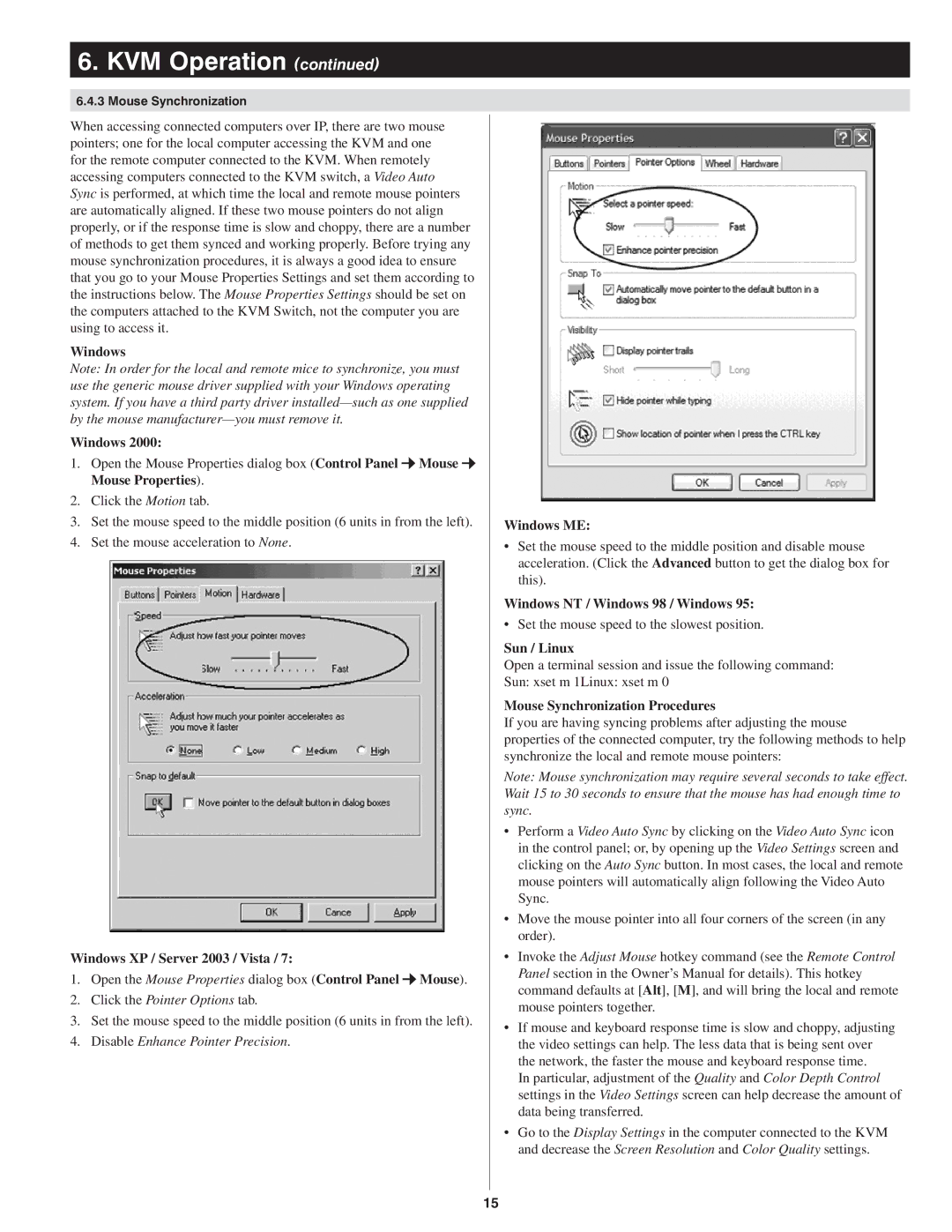
6. KVM Operation (continued)
6.4.3 Mouse Synchronization
When accessing connected computers over IP, there are two mouse pointers; one for the local computer accessing the KVM and one for the remote computer connected to the KVM. When remotely accessing computers connected to the KVM switch, a Video Auto Sync is performed, at which time the local and remote mouse pointers are automatically aligned. If these two mouse pointers do not align properly, or if the response time is slow and choppy, there are a number of methods to get them synced and working properly. Before trying any mouse synchronization procedures, it is always a good idea to ensure that you go to your Mouse Properties Settings and set them according to the instructions below. The Mouse Properties Settings should be set on the computers attached to the KVM Switch, not the computer you are using to access it.
Windows
Note: In order for the local and remote mice to synchronize, you must use the generic mouse driver supplied with your Windows operating system. If you have a third party driver
Windows 2000:
1.Open the Mouse Properties dialog box (Control Panel ![]() Mouse
Mouse ![]() Mouse Properties).
Mouse Properties).
2.Click the Motion tab.
3.Set the mouse speed to the middle position (6 units in from the left).
4.Set the mouse acceleration to None.
Windows XP / Server 2003 / Vista / 7:
1.Open the Mouse Properties dialog box (Control Panel ![]() Mouse).
Mouse).
2.Click the Pointer Options tab.
3.Set the mouse speed to the middle position (6 units in from the left).
4.Disable Enhance Pointer Precision.
Windows ME:
•Set the mouse speed to the middle position and disable mouse acceleration. (Click the Advanced button to get the dialog box for this).
Windows NT / Windows 98 / Windows 95:
• Set the mouse speed to the slowest position.
Sun / Linux
Open a terminal session and issue the following command: Sun: xset m 1Linux: xset m 0
Mouse Synchronization Procedures
If you are having syncing problems after adjusting the mouse properties of the connected computer, try the following methods to help synchronize the local and remote mouse pointers:
Note: Mouse synchronization may require several seconds to take effect. Wait 15 to 30 seconds to ensure that the mouse has had enough time to sync.
•Perform a Video Auto Sync by clicking on the Video Auto Sync icon in the control panel; or, by opening up the Video Settings screen and clicking on the Auto Sync button. In most cases, the local and remote mouse pointers will automatically align following the Video Auto Sync.
•Move the mouse pointer into all four corners of the screen (in any order).
•Invoke the Adjust Mouse hotkey command (see the Remote Control Panel section in the Owner’s Manual for details). This hotkey command defaults at [Alt], [M], and will bring the local and remote mouse pointers together.
•If mouse and keyboard response time is slow and choppy, adjusting the video settings can help. The less data that is being sent over the network, the faster the mouse and keyboard response time.
In particular, adjustment of the Quality and Color Depth Control settings in the Video Settings screen can help decrease the amount of data being transferred.
•Go to the Display Settings in the computer connected to the KVM and decrease the Screen Resolution and Color Quality settings.
15
